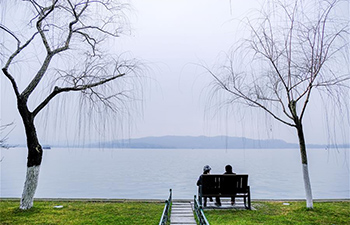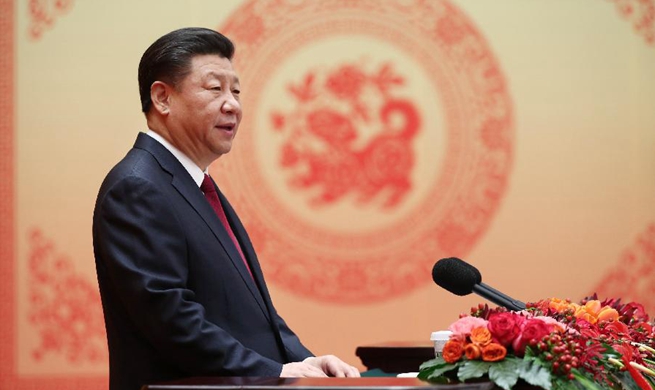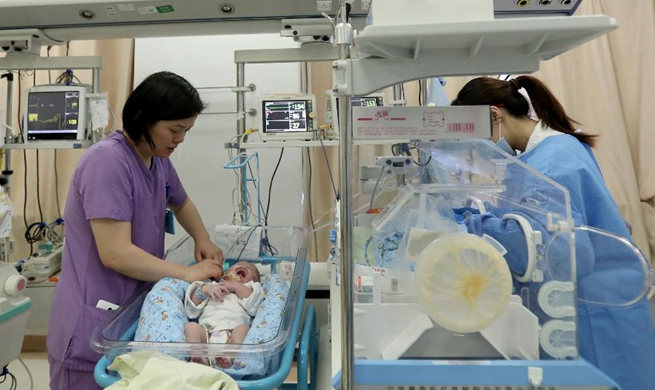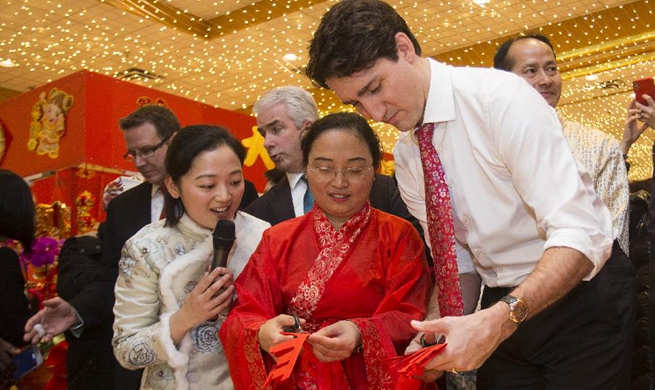GAZA, Feb. 16 (Xinhua) -- The 10-member family of Fadel al-Diri, a Palestinian homeless man in Gaza Strip, spent most of the cold days of winter in a small tent on a street's side.
Two weeks ago, al-Diri and his whole family were kicked out of their previous home after failing to pay the rent for five months.
Pitching a small shabby tent on the side of a street was al-Diri's only option to house his family.
"I cannot work since I suffer from diabetes, high blood pressure and paralysis in one of my legs," the 55-year-old man told Xinhua while sitting helplessly next to his tent.
Al-Diri said he could not afford to pay the rent for the original house owner due to his catastrophic financial conditions.
"Putting my family in a tent on the street was an option...I thought this may lead some wealthy people to help me," he explained in pain.
Gaza has been placed under a tight Israeli blockade since the Islamic Hamas movement seized the territory by force after routing forces loyal to President Mahmoud Abbas in 2007.
In the past six years, Israel and Hamas have been engaged in three major wars that have claimed the lives of thousands of Palestinians and Israelis.
The blockade has pushed Gaza's 2 million population deeper into poverty as unemployment rates has hit 45 percent, according to official figures.
Over 60 percent of Palestinian residents in Gaza are living in food insecurity as many rely on foreign food aid, according to international organizations and United Nations agencies.
A recent World Bank report also said the Gaza Strip ranks third across the Arab region in terms of poverty rates after Sudan and Yemen.
Al-Diri and his family spend the whole day in front of their tent, in hope to attract attention and win sympathy and help from the generous passersby.
"Some people gave us meals," Al-Diri said as his barefoot kids play around. "We dream of a roof overhead."
Living on the street is a miserable experience for Al-Diri's family, especially for the children.
Al-Diri's 11-year old daughter, Nesma, recalled that she and her siblings once woke up at one night in panic after heavy rains flooded their tent.
She also had to quit school after losing her home. "We do not go to school now because this place is far away from our schools," Nesma said.
According to a recently launched aid campaign named "Save Gaza," the social and economic situation of the Gaza population is on the verge of collapse, due to high rates of poverty and unemployment.
The campaign says that three-quarters of the people of the Gaza Strip need emergency relief assistance, while 40 percent of children are suffering from anemia and malnutrition, and 50,000 people with disabilities are in dire need of medical treatment and rehabilitation.
The situation in Gaza is expected to further deteriorate in light of the reduced funding by the United States to the UN Relief and Works Agency (UNRWA) in Gaza.
The U.S. announced on Jan. 16 to cut 65 million U.S. dollars from 125 million dollars that it had planned to provide to the UNRWA in 2018. More than half of Gaza residents rely on the support from UNRWA and other humanitarian agencies.
The economic deterioration and the continued blockade have prompted many traders and businesses in Gaza to refrain from receiving goods from Israel, amid calls for urgent intervention by the international community to end the suffering of the Palestinians there.
The UN Security Council held a consultative session on Wednesday to discuss the deteriorating humanitarian situation in the Gaza Strip, following warnings of a possible collapse of basic services in the Palestinian war-torn enclave.

















